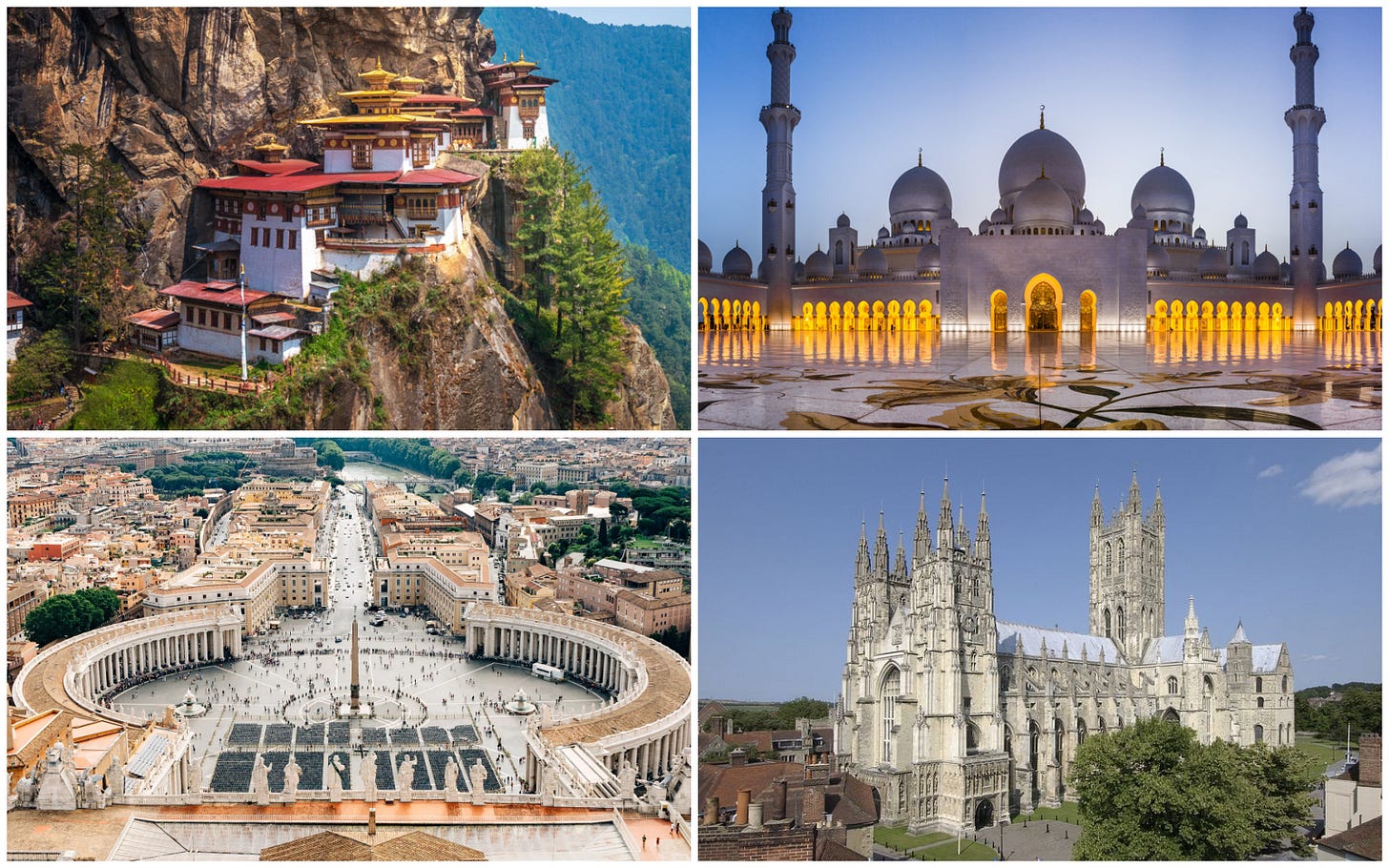Governments and Official Religions
The Political and Economic Implications of a State Sanctioned Religion
The United States of America does not have an official religion. Our First Constitutional Amendment was adopted two years after the Constitution was passed. That amendment reads:
Congress shall make no law respecting an establishment of religion, or prohibiting the free exercise thereof; or abridging the freedom of speech, or of the press; or the right of the people peaceably to assemble, and to petition the Government for a redress of grievances.
In 1791, this freedom of and from religion was a unique perspective. As was the second perspective that, although there is no official religion, Americans had the freedom to practice any religion and would not be persecuted.
Why was this religious neutrality unique in the late 18th Century? Is it necessary now?

Before 1800
In Roman and Greek times, a pantheon of Gods were worshipped across Europe. This promoted a hodgepodge of deities. Different regions or even families favored their personal preferences as the Greeks and Romans incorporated all of them. The people of Athens looked to Athena as the founder and protector of that city-state. Apollo was the patron of Delphi and Miletus. Hera was the patron for Argos.
Outside of the Roman / Greek tradition, other Gods existed. Byblos was protected by the Phoenician God, Ba’alat Gebel. In China, Cheng Huang Shen was worshipped and is still celebrated in parts of Taiwan.
In Europe after the birth of Christ, evangelists spread the Christian faith through much of the Roman Empire, threatening the government’s dominance. And so, like the pagan beliefs before them, Rome incorporated Christianity in 323. The first leaders of the Christian church were located in Rome, the center of Western Culture at the time. These were the Bishops of Rome. Like the pagans' gods before them, Rome incorporated Christianity to prevent dual loyalties of the people to the State and the Church. In 382, about 60 years later, the Council of Rome formalized which books were canon for the New and Old Testaments. For the next 700 years, a single Pope ruled from Rome with the backing of the Catholic Church.
The first significant break in Catholic rule occurred early in the 600s when Islam was founded. It spread quickly because Islam spread first in the Middle East along the trade routes, naturally spreading the religion. Furthermore, Islamic fighters conquered a lot of territory over time. Finally, Muslims treated conquered people of other faiths very well during this period. Other religions were tolerated, albeit not treated as equally as Muslims. For centuries, Muslims lived peacefully with Christians and Jews.
In 1054 the “Great Schism” occurred with the Roman Pope leading the Western Catholic Church and Michael Cerularius leading the Eastern Orthodox Church. This is important as this clash of religions and religious authority still resonates and guides many countries. A second break in the western church occurred in the early 1500s as the Protestant Reformation spread in Northern Europe. In an unrelated action, England’s King Henry rejected the Catholic Pope’s rule in 1534. The combined effect of these religious movements shrunk the reach of the Catholic Church until the great discoveries by Spain and Portugal spread the Catholic Religion throughout the world.
At the same time that Catholicism faced the new threats of the Orthodox and Islamic religions, the reigning religion in China, Confucianism, was also challenged by an offshoot, Buddhism.
From 1500 until the 1850s, nearly all organized nations had a singular foundational religion, albeit other religions were sometimes tolerated within their borders.
In most nations, the national official religion drove out non-believers. Catholic France drove out the Christian Huguenots, puritans fled England, and the Inquisitions of Spain and Portugal slaughtered non-believers – primarily Jews.
At the time of the US Constitution, it was one of the only nations which allowed freedom of religion.
Today – Official State Religions
I primarily rely on the Pew Research Data from 2017 for much of the religious factual data – LINK. https://www.pewresearch.org/religion/2017/10/03/many-countries-favor-specific-religions-officially-or-unofficially/
43 countries still have a national religion. Most of these countries are defined as Islamic, followed by Christian / Catholic, Buddhist, and Jewish state religions.
Not all these nations are antithetical to other religions, although they may legally favor a singular religion. Countries like Norway (Evangelical-Lutheran), Great Britain (Church of England), and Morocco (Islam) do not actively discourage other religions, but they do provide support to the state religion.
Another tranche of countries do not have an “official state religion” but favor a single religion legally and economically. They run a gamut of religions: Catholicism, Orthodoxy, Islam, and Buddhism.
A majority of nations do not have an official religion. This does not mean they are anti-religious. For example, in the United States, all houses of worship are not taxed. There is a preference in this case towards religion in general, but not a specific one.
Finally, 10 nations are hostile to religious institutions altogether. I think these nations look at religious institutions as competitors to governmental rule. Many are post-Soviet nations that have maintained the anti-religious stance of the USSR. Religious institutions challenge the leadership of countries like Cuba (Catholicism) and China (Tibetan Buddhism).
How Do State Religions or State Preferred Religions Affect a Country?
Positives
A state religion or a state-preferred religion can have positive effects on nations. For culturally homogenous populations, it can be yet another tie between individuals. And it can often indicate a break with the past.
Take the example of Poland under the control/influence of the USSR. The official communist position is that religion was a barrier to the organization of the state along more equitable lines. In 1978 Pope John Paul II was installed as the first non-Italian Pope in 400 hundred years. The Polish people bonded over his installation. His elevation also made it more difficult for the Polish government to ignore the Catholics. As the communist government slowly lost power in Poland, the church stepped up to provide support and direction for the country.
In Greece, the Greek Orthodox Church preserves traditions and history. The official designation also supports the many monasteries and churches that preserve Greek heritage and drive significant tourism.
In some countries, the church sets and maintains societal norms. These norms may be a lifeline as the governments change via elections, revolutions, or coups. Serbian Orthodox churches provided a uniting force and forged a path forward after the fall of Yugoslavia.
An official religion can also pave the way for a nation to spread soft power. The most prominent recent example of this is the rise of Wahhabism Islam. Saudi Arabia has sponsored Wahhabi Mosques in many countries outside the Middle East. Wahhabi Mosques can be found in North Macedonia, Bosnia, Germany, Malaysia, India, Maldives, Pakistan, Canada, the United States, and more. Some localities push back against the Saudi version of Islam, but the unrestricted funds for local projects and a new Mosque are usually welcomed in the community.
Negatives – Societal
The nations with a state or preferred religion may view some of these “negative aspects” as net positives. This list of negatives is from a non-religious point of view - in particular, mine.
In some countries, the official religion may support persecution of both adherents of other religions and the non-religious. And, if not outright persecution, they may confer a lesser status on the people of other (or no) religions. For example, Mauritania’s official religion is Islam. The country tolerates Christians, provided they are foreigners in Mauritanian for business or based there. Otherwise, there is a death penalty for anyone who is convicted of “blasphemous speech,” acts that are “sacrilegious,” and atheists. The wide latitude in the law can lead to the government using religion to control the people.
If a diversity of opinions and freedom from control benefit a country, Mauritania will lose out on those.
Religion can also be used to maintain or usurp political power. Malaysia is an Islamic country that is usually tolerant of other faiths. However, the Malaysian government has often been accused of using the tenets of Islam to control politicians and sometimes to drive others out of power when it is convenient. The claim may be that these people aren’t Muslim or aren’t devout enough, even though the actual reason behind the action may be a ploy to maintain government dominance.
In Indonesia, popular elected officials have been driven out of office by the Muslim clerics who motivate the faithful.
International, the world is primarily free of wars based on “official” religions. The forever conflict in Israel and Gaza/West Bank Palestinians is an exception, not the rule. There are many internal conflicts based on religious divides but very few international conflicts.
Negatives – Economic
Countries antagonistic toward other religions can lose international talent that does not follow the national religion. They may even lose out on nationals who leave the country for education and feel they cannot prosper in their home countries due to religion—a form of religious brain drain. Zaha Hadid was a successful Iraqi architect who drove businesses around the world. But as a woman, she would be bound by traditional roles in Iraq which limited her career options.
The other negative for many countries is the host country's perceived attitude towards some investors. Some investors may be locked out of a country or discouraged by their religious beliefs. For example, a Jewish or homosexual-owned company would face religious, not legal, hurdles to establishing a subsidiary or new company in nations of the world whose national religion supports “strict” Islamists.
Some more strict governments have carved out exceptions for foreigners to get around these issues. In the Maldives, the strict tenets of Islam are exempted from the resorts that bring in most of the government’s income. In Saudi Arabia, foreign enclaves for housing and amusements are designated for people on temporary assignment in the country. In Malaysia, retiring expats are usually tolerated and welcomed, particularly in the far north.

Religious Movements in Other Countries
Many of the statements above can also refer to countries with no “official” religion but still move towards implementing laws motivated by religion. Uganda uses religious justification for laws to keep the death penalty for homosexuality. Many US states use religion to justify the outlawing of abortion.
This essay doesn’t cover these exceptions.
The Future
For decades, I expected a movement toward more freedom of religion and away from the draconian imposition of religious values. I was incorrect. I based this thought on the movement away from Communism and its hostility towards religion.
Populism is on the rise worldwide, and a vital part of that is defending “traditional” religious values. Countries with no official or even preferred religion sometimes appeal to religious movements for power in countries. These include the United States, India, Mexico, Russia, and Hungary.
It seems to me that much of the world is in populist upheaval. We are at a fork in the future, and I am not optimistic that freedoms – religious and otherwise, will grow. On the other hand, this could be the last painful explosion of a frustrated institution.
An example of this was the Boxer Rebellion in China. It was an anti-imperialist movement that called out foreign missionaries and their Chinese adherents. Tens of thousands of Chinese nationals, missionaries, and their families were killed. And yet, it is remembered as the last gasp of people losing power.
There are these two roads: one giving more power to national religions and the other giving more power to secular institutions.
I hope it is the latter, but I fear the former over the short term.



